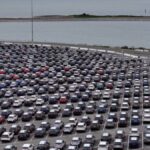The always-effervescent, leather-clad leader met with the prime ministers of Japan, Singapore, Malaysia and Vietnam, talking up each country’s potential to participate in the artificial intelligence revolution. He didn’t need to remind them to use Nvidia hardware, as they all eagerly welcomed his visit and, if anything, were the ones trying to entice him. He had a sales pitch, all the same.
“Demand for Nvidia AI supercomputers is significant. The world’s largest internet and cloud service providers started the first wave of demand. The next waves are here, with countries building sovereign AI infrastructures,” Huang said in Japan.
What he and Nvidia are looking to do is build out the proposition beyond the mere tool of the world’s best AI chip and into a more systematic AI development product. Whether called an AI supercomputer (which would typically be an assemblage of several pricey Nvidia AI parts clustered together) or, as Huang has taken to describing it lately, an AI factory, the pitch this month has been that every country needs to have one.
Nvidia’s vision of an AI factory is, to quote the company, “an accelerated computing infrastructure for transforming data into intelligence.” And in human language, in the specific context of talking to government leaders: those who have the AI chips will figure out faster how to best use the new technology than those on the sidelines.
He chose his visits strategically: Japan is keen to reclaim its semiconductor leadership and is investing billions into the effort. Singapore has set a target of tripling its AI practitioners. Shares in Malaysian utility firm YTL Power International Bhd. rocketed to an all-time high after its announcement of a partnership with Nvidia to build a $4.3 billion AI data center in the country. And Huang reserved his biggest compliment for Vietnam, saying it could prove to be a second home for his company, according to local media reports.
Beside being major potential customers for Nvidia, these nations also have the potential to bolster its supply chain. Huang has repeatedly said Nvidia seeks resilience and will do business with as many (reliable!) suppliers as it can. He told me back in June at the Computex trade show that Nvidia is assessing Intel Corp. as a potential maker of its AI chips and his company still has a relationship with Samsung Electronics Co., beyond mainstay Taiwan Semiconductor Manufacturing Co. that currently gets all those lucrative high-end orders.
Huang’s tour sketched out a vision for mutually beneficial collaboration between governments and business: they need his products to keep pace in the AI race and he needs a few things from them. I’d have been glad to listen in on the conversations with those prime ministers and what exactly each side was asking for.
As things stand, until Nvidia gets credible competition from Advanced Micro Devices Inc. or elsewhere, Huang has the upper hand in any negotiations, even with leaders of major economies. And he’s making the most of it.
Source : Bloomberg















